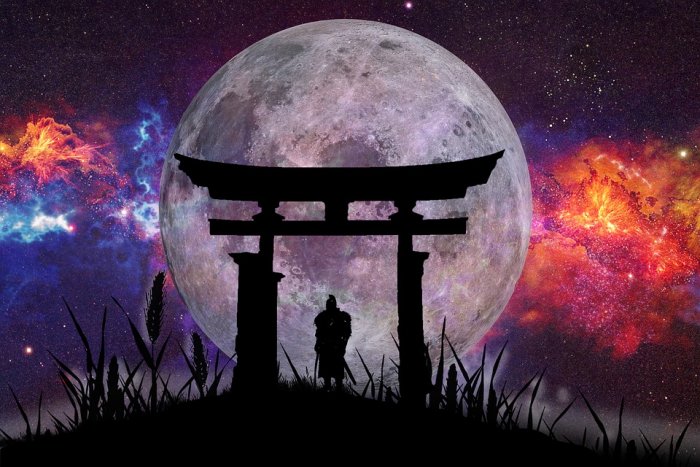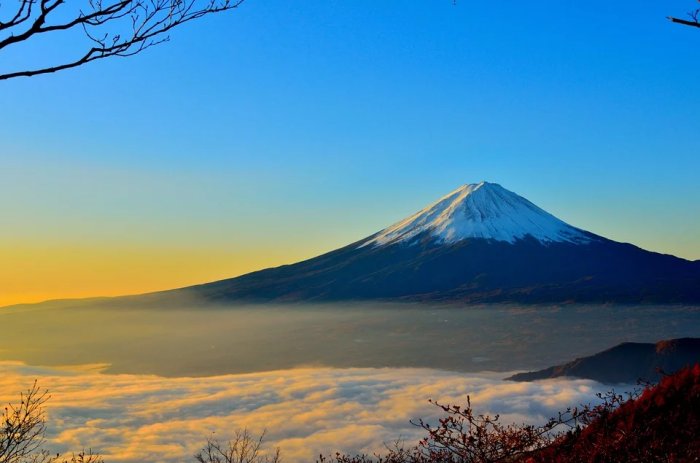First Dream Of The New Year – Japanese Hatsuyume Tradition
Ellen Lloyd – AncientPages.com - Like many other ancient cultures, people in Japan have long believed dreams can foretell the future.
For example, ancient Egyptians believed certain signs or events seen in dreams revealed unpredictable information about the future.
The first dream of the new Year decides how the next 12 months will be, according to the Japanese hatsuyume tradition. Credit: Public Domain
They used the messages in their dreams to cure illnesses, make important State decisions, and even decide where to build a temple or when to wage a battle. How dreams were interpreted can be found in the ancient Egyptian Dream Book, a hieratic papyrus that probably dates to the early reign of Ramesses II (1279-1213 BC).
According to the Japanese Hatsuyume tradition that dates back to the Edo period (1603 – 1868), the first dream you experience during the night of January 1 is significant.
The tradition of hatsuyume, which means "first dream," is based on the belief that the first vision you see in your dream predicts whether the 12 months ahead will be good ones.
According to the Japanese it is considered good luck to dream of Mount Fuji, a hawk, and an eggplant.
Why these three dream symbols are lucky is not entirely clear, and various theories exist.
"Sacred Mount Fuji on Honshu Island, Japan, has been a widely venerated mountain in Japan since ancient times. People of both Buddhist and Shinto faiths considered it an Abode of the Immortals.
The Japanese have long regarded certain mountains as objects of worship. They believed that mountains were sacred places where numerous gods resided. This belief still lives on and is continuously practiced in Japan." 1
Dreaming about Mount Fuji is very lucky in Japan. Credit: Public Domain
"At first glance, it may seem odd that the "first" dream of the Year was considered to be had on January 2. The reason for this line of thinking was that Edo people were not able to properly think about their dreams on the first night because of being tired from preparing for the New Year. So, they pushed the date or hatsuyume up by one day." 2
Some suggest that a combination of Mount Fuji, a hawk, and an eggplant represent strength, ambition, and goals. Mount Fuji is Japan's highest mountain, the hawk is a clever and strong bird, and the word for eggplant suggests achieving something great. Another theory is that the dream symbols go much further back in time and are connected to the three great revenge vendettas of the Edo Period that were made famous by Kabuki theater.
"It was during a hunting party at Mount Fuji that the Soga brothers finally got their long-sought revenge, a story played at most Kabuki theaters during January.
The hawk represents the Asano family's crest in the famous tale of the forty-seven samurai who avenged their lord called Chushingura, and the eggplant was on the family crest of Watanabe Kazuma, a leading protagonist in the Araki Mataemon revenge saga I gagoe. In those days, one's most essential desires (shows of fealty, loyalty, and honor) were often realized through revenge.
During this same time when hatsuyume became popular, these three samurai vendettas were quite the rage. The avenger's long-cherished desires were realized; his good character and loyalty proven, hence the connection with lucky dreams." 3
There is still disagreement about which night the hatsuyume is dreamed of. Most say hatsuyume takes place on the night of January 2, leading into the morning of January 3, but some Japanese people consider hatsuyume night to be January 1.
There were, of course, some ways to improve your luck of having an excellent first New Year dream. One could, for example, place a takarabune picture under the pillow. A takarabune is a "treasure ship" on which the Seven Gods of Fortune are often depicted.
In Japanese mythology, Baku is well-known for eating bad dreams, but this creature can also eat all dreams, not only nightmares. It includes dreams of aspiration, dreams of your future, and dreams of hope. Yet, according to ancient Japanese legend, one must be careful because you never know when Baku will appear in the dream world.
Written by Ellen Lloyd – AncientPages.com
Updated on December 26, 2023
Copyright © AncientPages.com All rights reserved. This material may not be published, broadcast, rewritten or redistributed in whole or part without the express written permission of AncientPages.com
Expand for referencesMore From Ancient Pages
-
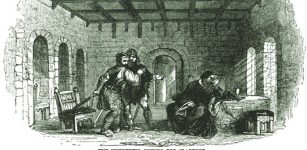 On This Day In History: George Plantagenet Privately Executed At The Tower Of London – On Feb 18, 1478
News | Feb 18, 2017
On This Day In History: George Plantagenet Privately Executed At The Tower Of London – On Feb 18, 1478
News | Feb 18, 2017 -
 Ancient ‘iPhone-Like’ Artifact Discovered At The Russian Atlantis
Archaeology | Sep 10, 2019
Ancient ‘iPhone-Like’ Artifact Discovered At The Russian Atlantis
Archaeology | Sep 10, 2019 -
 On This Day In History: The Battle of Salamis – Sep 22, 480 BC
News | Sep 22, 2015
On This Day In History: The Battle of Salamis – Sep 22, 480 BC
News | Sep 22, 2015 -
 Did The Babylonian Fish-God Oannes Visit Tiahuanacu?
Featured Stories | May 12, 2014
Did The Babylonian Fish-God Oannes Visit Tiahuanacu?
Featured Stories | May 12, 2014 -
 Did Our Ancestors Know About Artificial Intelligence?
Ancient Technology | Sep 2, 2015
Did Our Ancestors Know About Artificial Intelligence?
Ancient Technology | Sep 2, 2015 -
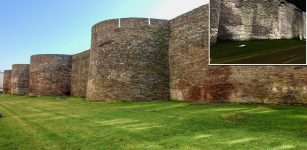 Walls Of Lugo: Finest Example Of Late Roman Fortifications – Stands The Test Of Time
Featured Stories | Sep 22, 2022
Walls Of Lugo: Finest Example Of Late Roman Fortifications – Stands The Test Of Time
Featured Stories | Sep 22, 2022 -
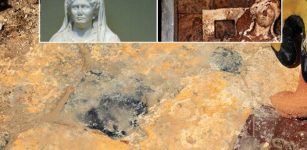 Sun Disk Unearthed On 3,500-Year-Old Rock Altar In Thracian Settlement, Edirne, NW Turkey
Archaeology | Sep 26, 2020
Sun Disk Unearthed On 3,500-Year-Old Rock Altar In Thracian Settlement, Edirne, NW Turkey
Archaeology | Sep 26, 2020 -
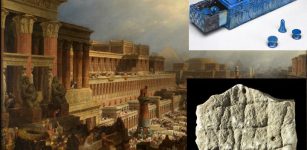 4,500-Year-Old Board Games And Game Pieces Unearthed At Gath
Archaeology | Jun 19, 2022
4,500-Year-Old Board Games And Game Pieces Unearthed At Gath
Archaeology | Jun 19, 2022 -
 Ancient Treasure Hidden In Perplexing Secret Underground Labyrinth In France – Discovery And Forbidden Excavations – Part 2
Featured Stories | Jan 19, 2020
Ancient Treasure Hidden In Perplexing Secret Underground Labyrinth In France – Discovery And Forbidden Excavations – Part 2
Featured Stories | Jan 19, 2020 -
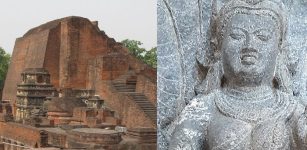 Unique 1,300-Year-Old Pala Period Idol Of Snake Goddess, Nag Devi Discovered Near Nalanda University, India
Archaeology | Apr 5, 2022
Unique 1,300-Year-Old Pala Period Idol Of Snake Goddess, Nag Devi Discovered Near Nalanda University, India
Archaeology | Apr 5, 2022 -
 3,000-Year-Old Fortress Built By The Mysterious Votadini Tribe Discovered On Top Of Arthur’s Seat
Archaeology | Sep 11, 2020
3,000-Year-Old Fortress Built By The Mysterious Votadini Tribe Discovered On Top Of Arthur’s Seat
Archaeology | Sep 11, 2020 -
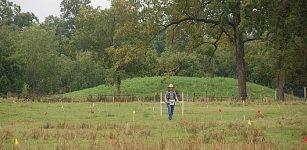 Remains at Crenshaw Site Are Local, Ancestors Of Caddo – New Study
Archaeology | Jun 15, 2023
Remains at Crenshaw Site Are Local, Ancestors Of Caddo – New Study
Archaeology | Jun 15, 2023 -
 Forbidden Ancient Manuscripts Almost Erased From History – Unusual Myths, Beliefs And Practices – Part 2
Artifacts | May 11, 2018
Forbidden Ancient Manuscripts Almost Erased From History – Unusual Myths, Beliefs And Practices – Part 2
Artifacts | May 11, 2018 -
 Fluctuating Oxygen Levels May Have Accelerated Animal Evolution
Archaeology | Oct 19, 2022
Fluctuating Oxygen Levels May Have Accelerated Animal Evolution
Archaeology | Oct 19, 2022 -
 How Large Was The ‘Giant’ Dunkleosteus Terrelli – Prehistoric King Of The Oceans?
News | Apr 10, 2023
How Large Was The ‘Giant’ Dunkleosteus Terrelli – Prehistoric King Of The Oceans?
News | Apr 10, 2023 -
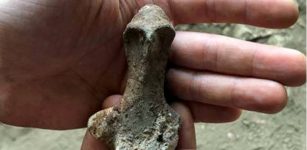 Rare 7,000-Year-Old Clay Figurine Discovered In Battifratta Cave, Lazio
Archaeology | Jul 29, 2023
Rare 7,000-Year-Old Clay Figurine Discovered In Battifratta Cave, Lazio
Archaeology | Jul 29, 2023 -
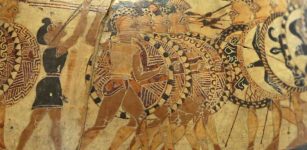 Why Didn’t The Spartans Build City Walls?
Civilizations | May 30, 2022
Why Didn’t The Spartans Build City Walls?
Civilizations | May 30, 2022 -
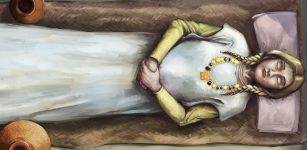 Spectacular Anglo-Saxon Burial Uncovered – Here’s What It Tells Us About Women In Seventh-Century England
Featured Stories | Dec 17, 2022
Spectacular Anglo-Saxon Burial Uncovered – Here’s What It Tells Us About Women In Seventh-Century England
Featured Stories | Dec 17, 2022 -
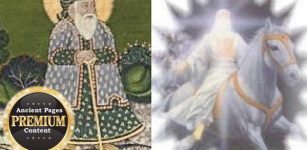 Mystery Of Hizir – One Of The Most Enigmatic And Extraordinary Ancient People
Featured Stories | Oct 16, 2018
Mystery Of Hizir – One Of The Most Enigmatic And Extraordinary Ancient People
Featured Stories | Oct 16, 2018 -
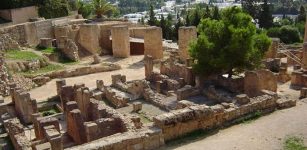 Carthage: Prosperous Phoenician Colony That Became Dominant Power In The Western Mediterranean
Featured Stories | May 21, 2020
Carthage: Prosperous Phoenician Colony That Became Dominant Power In The Western Mediterranean
Featured Stories | May 21, 2020

